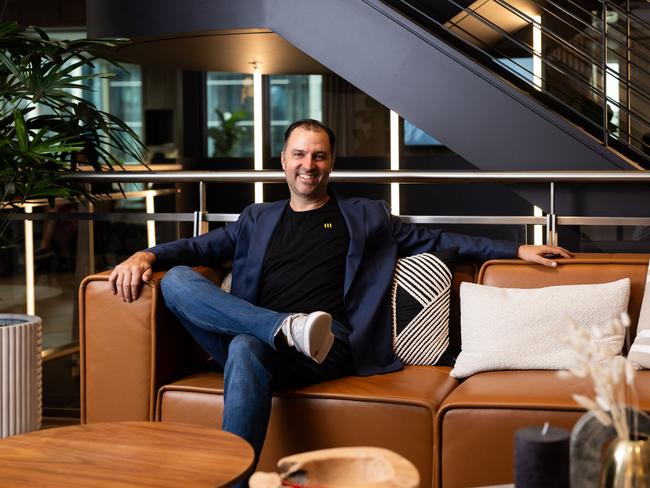‘Evolving’: The future of the four-day work week in Australia
The four-day week push has been gaining momentum in recent years, now there is a growing call for a “shift” to take place in Aussie workplaces in 2025.
Business
Don't miss out on the headlines from Business. Followed categories will be added to My News.
The four-day work week debate is one that has been gathering steam in Australia for a few years now.
Over the past 12 months in particular we have seen a sharp rise in companies adopting the new working model, with Medibank and Bunnings among the major Aussie brands that have begun trialling the change.
As we head into 2025, there are those that believe the four-day week will become increasingly popular.
In fact, research from recruiter Robert Half revealed that just over a third of Australian companies surveyed expect their organisation will transition to a four-day work week within the next five years,
Fundraising platform, Raisely, is one of the companies who has already adopted the change, with Chief Customer Officer, Jordan Maitland, “confident” that more Aussie businesses will embrace this model in the new year.
“The world of work is evolving, and businesses that resist change risk losing out on talent,” she told news.com.au.
“With growing conversations around mental health and work-life balance, the four-day work week feels like the logical next step.”


One of the common ways that companies implement a four-day week is by using the 100:80:100 model, in which staff keep 100 per cent of their pay but have their work hours reduced to 80 per cent.
However, they must maintain 100 per cent of their productivity in order for the change to work.
Other options include allowing staff to work a shorter week but for less pay, or offering standard 40 hour weeks condensed over four days.
After Raisely initially trialled the four-day week, Ms Maitland said 96 per cent of the team expressed a desire to continue with the shorter week once the trial period ended.
When they first introduced the change, she said he knew that it would be “transformative” for the company, but didn’t “expect just how profoundly it would reshape how we work, connect, and thrive together”.
“We live in a world where hustle culture is glorified, where success is often equated with jam-packed schedules and relentless productivity. But that model isn’t sustainable - it leads to burnout and mental health struggles,” she said.
“The four-day work week isn’t just a novel concept; it’s about reclaiming time, working smarter, and putting people first.”
During the initial trial, staff at Raisely reported their work-life balance improving by almost 18 per cent, as well as an increase in energy levels and confidence.
The move also had a positive impact on productivity, with a 10.1 per cent improvement.
Ms Maitland noted that the bar was set “pretty high” in these areas, so it was “exciting” to see these kinds of numbers.
She said more companies need to start coming to the table and join the four-day week conversation.
“It’s time for a cultural shift. The conversation needs to go beyond trials and pilots - it’s about trust. Trust in employees, trust in the process, and trust that when people are supported, they show up as their best selves,” Ms Maitland said.
However, Matt Loop, VP and Head of Asia at global HR platform, Rippling, said there could be some hindrances with a wider rollout of the four-day week in Australia.
Speaking to news.com.au, he noted that, while the change it gaining momentum globally, its adoption in Australia will likely depend on the industry.

Recent research from Rippling indicated that, while 75 per cent of business leaders surveyed believe a four-day week would benefit company productivity, only 25 per cent are considering implementing it in this financial year.
“This gap between support for the policy and actual implementation highlights concerns over managing workloads and maintaining consistent output on compressed schedules,” Mr Loop said.
“While a four-day work week may not be suitable for every business, those willing to pilot or adapt the model could gain a compelling edge in attracting and retaining talent.
“Success lies in balancing reduced hours with operational needs to sustain performance without overburdening employees.”
While there are varying opinions on when or if a widespread rollout of the four-day week will come to Australia, there have been some promising signs from some of the country’s major companies.
In October, Medibank announced it would be expanding its four-day work week “experiment” to include 500 employees, after a six month trial found staff had become happier, healthier and more efficient.
Before starting the initial trial, the private health insurer said its goal was to challenge the “long-entrenched traditional ways of working”.

The trial was designed with 4 Day Week Global, a leader in this space, and the outcomes have been and will continue to be monitored and measured by Macquarie University’s Health and Wellbeing Research Unit.
This experiment is one of the biggest in Australia of its kind, with Medibank’s Head of People, Spaces and Sustainability Kylie Bishop saying the trial has delivered positive results across multiple areas.
“We’ve seen significant and sustained improvements in employee engagement, job satisfaction and the health and wellbeing of participants, while maintaining business performance and customer outcomes,” Ms Bishop said.
In 2023, Bunnings signed an agreement with the Shop Distributive and Allied Employees Association (SDA) for a four-day work week trial.
As part of the move, 40,000 were given the option to work a standard 40-hour week condensed into four days.
“These are advances the SDA will be pursuing in upcoming rounds of negotiation with other major retailers,” SDA national secretary, Gerard Dwyer, said at the time.
“This package is good for workers and for this major retailer alike, setting Bunnings up as a preferred employer in a tight retail market.”
Originally published as ‘Evolving’: The future of the four-day work week in Australia





